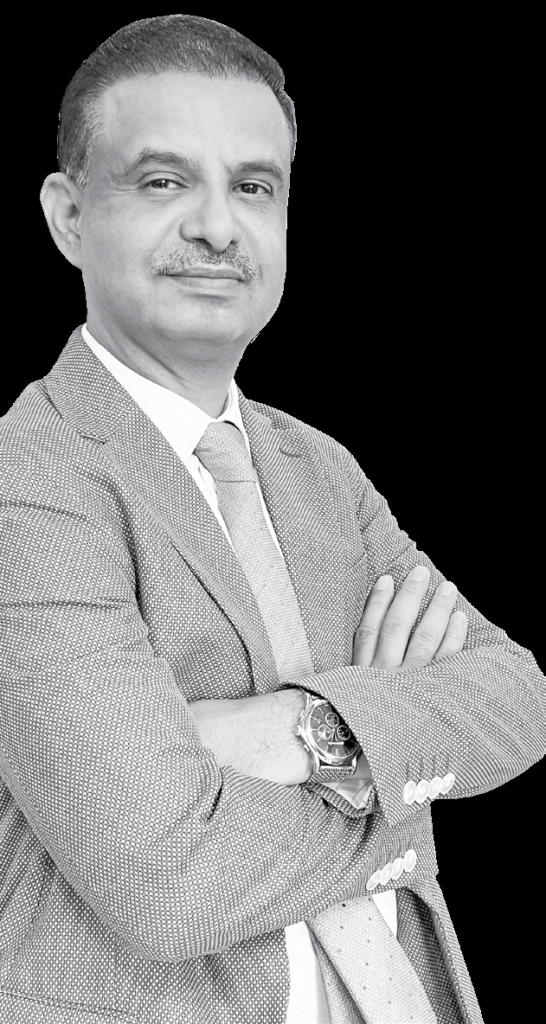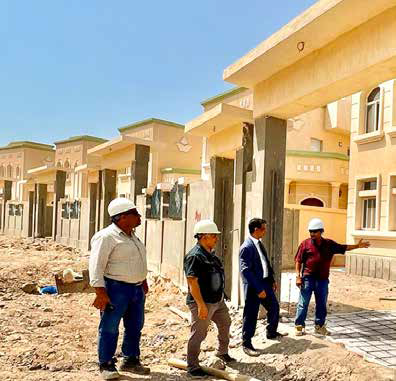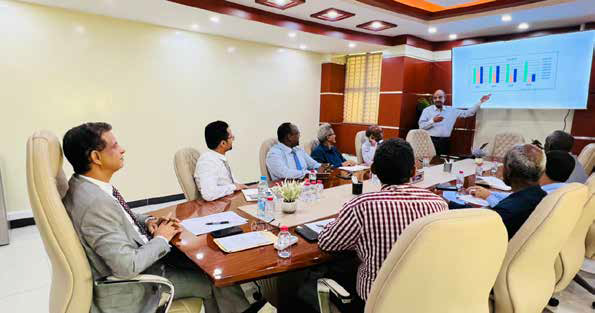ABDULRAQEB FAREA ALI SALEM- General Director Saba African Bank
DJIBOUTI IS ASMALLCOUNTRYBUTITHASSIGNIFICANT PROPORTION OF THE BANKING SECTOR BEING RUN IN COMPLIANCE WITH SHARI’A. WHAT FACTORS, IN YOUR OPINION, HAVE LED TO THE GROWTH OF ISLAMIC BANKING IN THE COUNTRY?
Several factors have contributed to the increased number of Islamic banks operating in Djibouti. One of the prime factors is the awareness among the general public regarding the importance of Islamic banks that conform to the principles of Islamic law.
The success of the first banking experience of Saba Bank in Djibouti has encouraged other investors to repeat the experience and benefit from the increasing and growing demand for Islamic products and services. Thus, many banks were established to satisfy this demand. In addition, the Islamic Banks Act of Djibouti allows Islamic banks to invest directly in different sectors.
SABA AFRICAN BANK HAS BEEN PIONEERING ISLAMIC BANKING IN DJIBOUTI AND AFRICA. WHAT INNOVATIVE PRODUCTS AND SERVICES ARE BEING OFFERED BY THE BANK TO ITS CUSTOMERS THAT NOT ONLY MEET THE ASPIRATIONS OF CUSTOMERS BUT ALSO CONTRIBUTE TO SUPPORTING THE NATIONAL ECONOMY?
Being the first Islamic Bank in Djibouti, we have always focused on offering Islamic financing and operating products to meet the customers’ expectations of the new experience. Accordingly, we have provided various forms of financing, and placement of funds under banking regulations and Shari’a rules, which covers the needs of the public and investors in line with the momentum of Islamic banking. Moreover, we have innovated our investment portfolios to perform and support the establishment of local development projects that are specific and cost-effective.

These portfolios are some of the most important financial products offered by Islamic banks for their customers to provide domestic and foreign resources to support the direct economic development of the country. Since the inception of the Bank in Djibouti, we have made great efforts to contribute to the development of the real estate sector, which is one of the key economic elements of Djibouti and a vital and promising field. We have established the largest modern residential city, the Saba Residential City. The first phase of this city has been completed, and we are currently finalising the construction of the second phase. It will be a great sight of modern Djibouti and will cover a significant part of the need for suitable and appropriate residential places to meet the needs of the public, investors and visitors to the country. We will also soon start the inauguration for a city for middle-income people located in Demurjuj.

WE HAVE ESTABLISHED THE LARGEST MODERN RESIDENTIAL CITY, THE SABA RESIDENTIAL CITY. THE FIRST PHASE OF THIS CITY HAS BEEN COMPLETED, AND WE ARE CURRENTLY FINALISING THE CONSTRUCTION OF THE SECOND PHASE.
We offer the latest digital banking services through modern automated and electronic systems that the Bank has bought since the beginning of 2022. Customers will get numerous automated services that will meet their expectations and be highly efficient.
INDUSTRIAL REVOLUTION 4.0, FINTECH AND BLOCKCHAIN ARE THE ADVANCING TECHNOLOGIES OF TODAY. ARE THESE DEVELOPMENTS RELEVANT TO THE BANKING SECTOR IN DJIBOUTI? IF SO, WHAT SHOULD THE GOVERNMENT OR OTHER BODIES DO TO ENSURE THAT BANKS IN DJIBOUTI BENEFIT FROM THEM?
The saying that the world has become a global village owing to the immense telecommunication revolution, however, doesn’t accurately describe the situation. The successive developments in telecommunications and information technology, which have impacted business, financial instruments and currencies that emerge from time to time, have reduced the world to a mere house instead of a small village. In this day and age, only through your smartphone while being in the bedroom you can manage your business, transactions and payments, and even do much more. Today, one has the ability to create and manage a business just by using a cell phone.
The developments that are rapidly emerging require us to keep up and be proactive, as those who fall behind will realise that they have been out of tune. This makes it necessary for the Central Bank of Djibouti and all relevant institutions and ministries to comprehend these changes and work together to ensure that businesses continue to benefit and serve the country. Therefore, the Bank has worked hard to acquire the latest banking system.
WHAT SPECIFIC MEASURES HAS SABA AFRICAN BANK TAKEN TO ENHANCE ACCESS TO MICROCREDIT FOR MICRO AND SMALL ENTERPRISES IN DJIBOUTI TO ENSURE FINANCIAL INCLUSION AND FINANCIAL INDEPENDENCE FOR THE POPULATION?
As a financial institution, working in accordance with the principles of the Islamic Shari’a in the fields of economy and Islamic banking, we have in place several objectives. The first of which is to pay great attention to the middle and low-income citizens through opening up possibilities and opportunities of financing small enterprises.
The aim is to improve a person’s income or consumer financing, which is considered an added value, such as building a house for the family, supporting them for its furnishing, or facilitating suitable means of transportation in order to ensure a decent life. The Bank has recorded great levels in this field with a significant number of beneficiaries from the financial services in the private sector.

Currently, we are looking forward to establishing a specialised unit for micro-enterprises and microfinance to ensure reaching a majority of these people, supporting them with income-generating projects so that the Bank keeps being the leader in the banking sector to engage in new fields of business and service.
SABA AFRICAN BANK OCCUPIES A PROMINENT POSITION IN DJIBOUTI’S BANKING STRUCTURE, PLAYING A MAJOR ROLE IN SHARI’A-COMPLIANT INVESTMENT AND FINANCING. SABA AFRICAN BANK WAS NAMED THE STRONGEST ISLAMIC RETAIL BANK IN DJIBOUTI FOR THE YEAR 2021. HOW WILL THIS ACHIEVEMENT OPEN UP PROSPECTS FOR THE BANK IN THE LONG RUN?
There is no doubt that it is a merit that we should be proud of and that will enhance the Bank’s approach and policies in this regard. This achievement will result in us being motivated to provide the best in this field as we realise that the genuine development of developing economies begins with supporting its individuals and improving their income to achieve a decent life. It is a mutual responsibility among all institutions, official or private, concerned with the revival and the management of the economy, and Islamic banks should be at its forefront.
WHAT LESSONS CAN DJIBOUTI LEARN FROM OTHER COUNTRIES THAT ALREADY HAVE AN EXTENSIVE ISLAMIC BANKING SYSTEM TO DEVELOP AND EVOLVE ISLAMIC BANKING AND FINANCE IN AFRICA?
Islamic banks have only been in existence for around 50 years since the first bank was established. During this period, experience has been developed steadily in theoretical and practical aspects. Banks have offered many different products and contracts that meet the economic and development needs with high levels of efficiency and effectiveness. They have played a prominent role in the world economy, particularly during periods of economic recession and crises that have devastated different financial sectors.
It also showed that Islamic banks were not affected by these crises, due to their approach and the nature of tools used in their activities and business models. As a result, many international banking institutions in non-Islamic countries opened specialised Islamic windows to operate according to the Shari’a principles.


NESTLED ON THE UPPER SIDE OF THE HORN OF AFRICA, DJIBOUTI IS MOVING FORWARD AT AN INCREDIBLE STRIDE. THE GOVERNMENT OF DJIBOUTI HAS ENGAGED IN AN AMBITIOUS REFORM PROGRAMME. ITS VISION 2035 IS AIMED AT DIVERSIFYING THE ECONOMY. WHAT ROLE CAN ISLAMIC BANKING AND FINANCE PLAY IN THIS REGARD?
The banking sector nowadays plays a vital and leading role in Djibouti’s economy. Despite, the recent experience of Islamic banks in the banking sector in the country, their share of assets reaches only about 25%. It is a big share compared to the preceding period of Islamic banking and is subjected to increase dramatically. Also, the impact and effect in the development are tangible and more visible considering the nature of their tools used in business, such as direct investment managed by banks in particular. Islamic banks will also be able to get more resources to finance strategic projects in the country through sukuk investments.
DJIBOUTI IS NATURALLY POISED TO BE A GATEWAY FOR NEARBY COUNTRIES LIKE ETHIOPIA, SOMALIA AND RWANDA. WHAT OPPORTUNITIES AND CHALLENGES DO YOU FORESEE IN DEVELOPING ISLAMIC FINANCE AS AN ALTERNATIVE ECONOMIC SYSTEM IN THE REGION?
Located in a unique geographical location, Djibouti has been a pivotal state with an enormous impact exceeding its geographical or demographic size.
Consequently, it is considered the gateway to the economy and trade of a big country like Ethiopia and influences a neighbouring country like Somalia. It is because the experience of those countries in the Islamic banking sector is new, there is no doubt that Djibouti will play a role in enriching those emerging economies and providing them with the experience and competence necessary to make them complete and contribute to their success.
WHAT KEY FACTORS HAVE ENABLED DJIBOUTI TO IMPROVE ITS POSITION IN THE GLOBAL MARKET AS A COMPETITIVE INVESTMENT ENVIRONMENT WITH AN ATTRACTIVE PROFILE FOR FOREIGN INVESTORS WITH REFERENCE TO SABA AFRICAN BANK?
The most important factors can be summarised as follows:
- The unique geographical location of Djibouti.
- Political and security stability of the country compared to the neighbouring and many African countries.
- Encouraging and attractive privileges to
- investors guaranteed by the Investment Law
- Initiatives taken by the political leadership to move toward the improvement of the economy and creating real and inclusive development supported by the Government’s Vision 2035.
All these and many other factors have contributed towards creating an investment environment that is appropriate and attractive to local and foreign investors and has started to pay off in the field of economic development in the country. This is evident through the figures that show Djibouti recording the highest rate of economic growth in the African continent over the last five years.
The existence of the Bank and its activities have met all the expectations and contributions remarkably in Islamic banking, attracting foreign capital and motivating investors to engage in investment in Djibouti. The Bank has supported and financed several developing and producing enterprises in the country.
THE AFRICAN CONTINENT ALFREET RADEAREA (AFCFTA) IS AN AMBITIOUS TRADE PACT TO FORM THE WORLD’S LARGEST FREE TRADE AREA BY CONNECTING ALMOST 1.3BN PEOPLE ACROSS 54 AFRICAN COUNTRIES. HOW DO YOU THINK THIS AGREEMENT WILL DEEPEN THE ECONOMIC INTEGRATION OF AFRICA?
It is an ambitious agreement and a step towards paving the way to solidarity and cooperation among African countries. The aim is to create a better future for the people of this continent, who have been suffering many problems and obstacles preventing them from achieving advanced levels of sustainable development.

The implementation and activation of the role of the African Continental free-trade area will help bring about profound reforms needed to enhance long-term growth in the African countries participating in this agreement. It will reduce tariffs among member countries and cover procedures necessary to facilitate trade and services.
In addition to regulatory measures such as health standards and technical barriers, implementation of this agreement will result in the restructuring of markets and economies in all countries of the continent and strengthening the production in the sectors of services, manufacturing and natural resources. If applied successfully, it will contribute to absorbing millions of labourers into the business market, reducing and eliminating levels of unemployment and poverty.
WHAT IS YOUR FUTURE VISION FOR SABA AFRICAN BANK AND ITS ROLE IN THE ECONOMIC DEVELOPMENT OF THE REGION?
We visualise that we have to take a lead in the Islamic banking sector in Djibouti and contribute towards achieving the ultimate goals of the development of this country. Therefore, we have taken strategic decisions early on for investing the largest proportion of the Bank’s resources that can be invested in the field of local development.
We, being the first Bank in indirect investment, have set out to build the largest residential city set in modern and advanced specifications. We have also planned the construction of the largest residential city for middle-income people, which has encouraged many investors and competitive banks to follow in the same footprints.
The Bank has several projects in place aimed at supporting and financing the promising and limited industrial sector under the current circumstances, as well as small and micro-finance projects as well. This is considered a major point for building sustainable and inclusive development and contributing to various sectors involved in raising the levels of economic growth of the country and the well-being of people, such as education, health and production.



